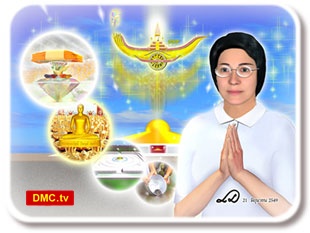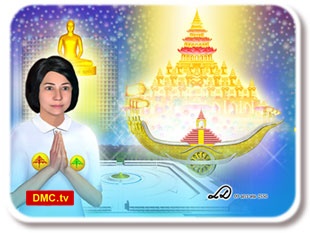Question:
Dear Luang Phaw, Buddhists today have wondered whether if it
could be true for Prince Siddhattha to take seven steps immediately after he
was born. How can we explain this
phenomenon to a skeptic?

Answer
by Venerable Dhattajeevo Bhikku
Could the story of the newborn Siddhattha taking seven steps
immediately after birth be true? Not only have you and many others wondered
about it, I did too! I have been wondering about it since I was a child. Only until the last years of college did my
doubts about this occurrence disappeared.
Why do we have doubts? Let’s first start here. Well, because the occurrence, if compared to
our own experience in this world, seems incomprehensible, but it doesn’t mean
that we can’t contemplate on it. We can
still reflect on it. The question is whether
the depth of our knowledge and mind is sufficient to reach the truth.
Let’s compare it to advanced Mathematics or Physics. If we
presented these advanced subjects to middle school students, they will be
unable to comprehend the material because their foundation is insufficient.
Lord Buddha considered these kinds of questions as Acinteyyas, which means that
they are beyond our comprehension. The
four things in this world which are considered Acinteyyas or
incomprehensible are:
1. The power of Lord Buddha,
Buddha-visaya, which we are discussing.
2. The
sphere of the trances, jhana-visaya; describes the exalted meditation ability of a
person with an extraordinary clear mind. It brings exceptional grace and capability,
such as the ability to recall past lives.
3.
Retribution (kammavipaka) of the results of our actions. We know that doing
evil brings unfavorable consequences, and doing good brings favorable results.
However, kamma is more complex and intricate than that if we want to pinpoint
to the exact details of what could happen from a specific action. Only when we
train ourselves to the fullest extent in generosity (dana), moral conduct
(sila), and mental development through meditation (bhavana) can we have
the clarity of mind to do it.
For example, we now know
that our body is made from the food we eat, but we cannot specify exactly which
muscles are derived from which food. We
just know that our body is sustained from the food we’ve consumed.
Our intelligence is unable to clearly differentiate things
that are extremely profound because there is a limit to our ability. For that reason, Lord Buddha has taught us a
simple paradigm: The Law of Karma. There
is always a consequence to our actions, whether it is positive or not. He did not elaborate on specific details
because our mind is too limited to comprehend them.
4. Dwelling
on how the world came to be, (loka-cinta); who created it or whether it occurred
naturally. Don’t waste your time
contemplating it. It is beyond our
ability. If we can recall past lives, we
can then recall the Earth’s creation. Since we do not have that ability, don’t
waste your energy trying to figure it out.
Now, if we use the analogy of Acinteyyas as advanced
Mathematics, then our knowledge is only at the level of preschoolers. We are
incapable of understanding the subject thoroughly. Therefore, to explain
whether newborn Siddharta could immediately walk after birth, I will offer some
helpful hints to help with your understanding:
1. Before Lord Buddha was born, he had accumulated a tremendous
amount of merit. In Buddhist terms, this
accumulation is called the Perfections. In essence, the Perfections are accumulated merit over many lifetimes. Merit arises when one does good deeds
repeatedly. When one puts his life at
stake to do good deeds, that merit has even more potency. This type of merit He considered the
Perfections.
Lord Buddha had fully pursued the Perfections in each of His
past lifetimes. Its power gave Him “The
Body with the Marks of a Great Man,” which had the thirty two auspicious signs.
His body was unblemished, well shaped and proportionate. It was perfect in
every way, ever since He was in his mother’s womb. He was unlike any other child. While He was in her womb, He was able to
position Himself in a meditative position. He wasn’t moving all over the place
like us in the womb. It was the result
of the tremendous merits he had tirelessly pursued.
2. He was in his mother’s womb for exactly ten months, no
more and no less.
3. His every body part was flawless and perfect in shape and
size.
4. While pregnant, Lord Buddha’s mother was in excellent health.
More importantly, she observed the precepts diligently, maintained a clear,
kind and generous mind, meditated, and gave donations during the entire
pregnancy. Therefore, the little Bodhisatta was in the womb as if he was an
arahant in the highest form of happiness from deep meditation
(nirodha-samapatti) unlike all other babies.
Being in a sublime state of meditation, the Bodhisatta’s mind
was continuously purified. As for the birth, unlike us, the Bodhisatta came
into the world with his feet first, which gave stability to his body. As a
result of his enormous merits from the Perfections, immediately after he was
born, he touched the ground with both feet, stood up, and was able to walk with
full awareness.
It is complicated to grasp the concept of karma because we
are so used to bad karma that we do not recognize the effects of good karma.
Let me give an example of a bad kamma. Because of negative karma, fish can swim
immediately after birth, but not us. Fish and fowl were born as a result of
negative karma that influenced their conditions. However, Lord Buddha was influenced by
positive karma, through the Pursuit of the Perfections.
Let me leave you with a little reminder whenever you think of
the future. Human beings have the
tendency to think that everything revolves around them and anything beyond our
immediate understanding simply cannot be possible. However, we must remember
that the Bodhisatta, unlike us, accumulated Perfections. His endeavor was significantly greater and
fundamentally different from our own. For this reason, His efforts became a part of His characteristics known as
the Buddha Attributes. Please listen to
the things I’ve said, and do not just believe or reject it. Focus on the practice of meditation
wholeheartedly. Once you attain a crystal-clear, calm, and radiant mind, you
will understand thoroughly on your own all the difficult subjects that I’ve
mentioned and be able to explain them to the world much better than I can. Just continue to practice meditation and soon
you will understand. It is not
difficult.



